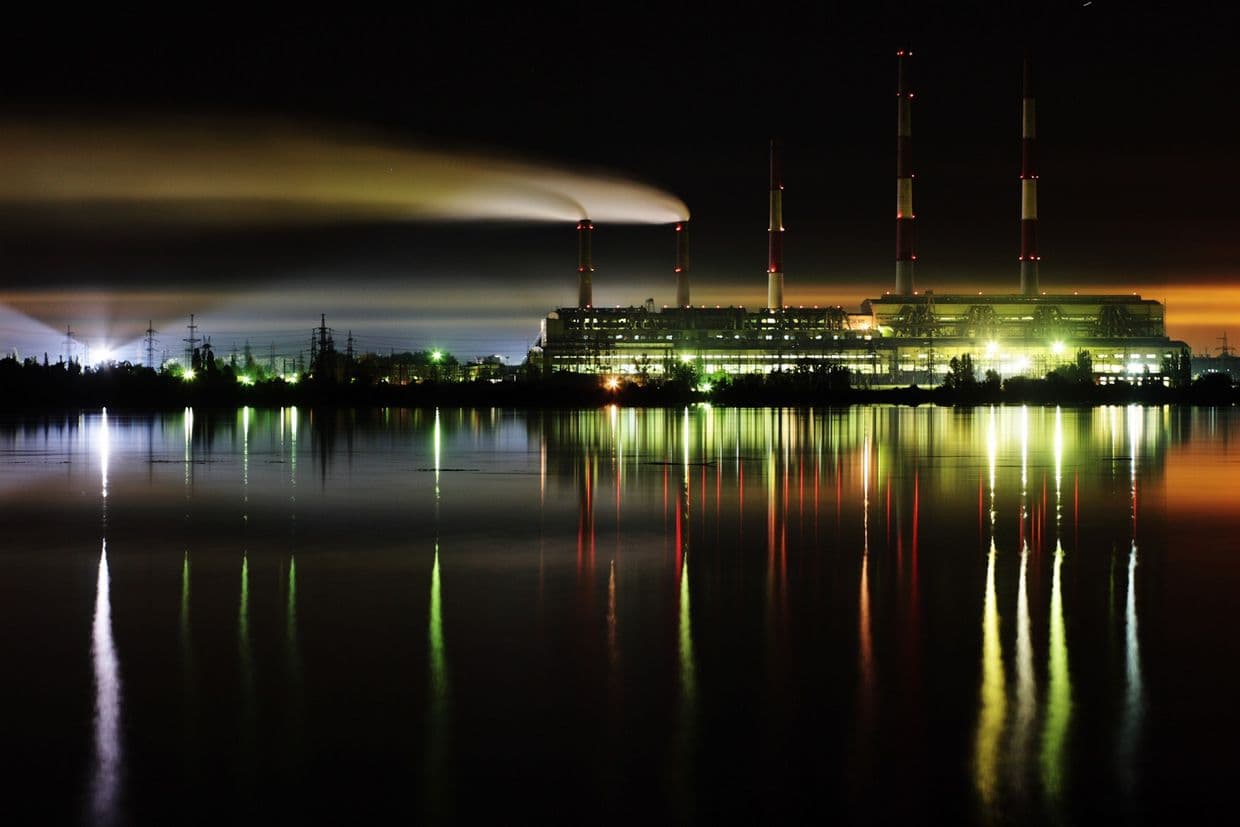Ukraine Business Roundup — Business & War

The following is the April 16, 2024 edition of our Ukraine Business Roundup weekly newsletter. To get the biggest news in business and tech from Ukraine directly in your inbox, subscribe here.
Russia’s large-scale attacks against Ukraine’s energy system late last week have stoked fears of renewed country-wide blackouts and highlighted Ukraine’s urgent need for more air defense to protect its critical infrastructure.
The Kremlin launched over 80 missiles and drones against the country in the early hours of April 11, targeting thermal power plants across Ukraine, including the Trypillia plant, the main electricity supplier to Kyiv, Zhytomyr, and Cherkasy oblasts.
Ukraine’s state energy company Centerenergo said that with the destruction of the Trypillia plant, Russian attacks have led to a complete loss of its generating capacity in the country.
The attacks also targeted oil and gas giant Naftogaz’s underground storage facilities, one of which is the largest in Europe with a capacity of 30 billion cubic meters, where foreign traders rented 2.5 billion cubic meters of storage space last year. The company has not commented on the extent of the damage.
Traders were set to start injecting again soon (and some already had), but one foreign trader, German state-owned natural gas trader SEFE, expressed concern that resuming injections into Ukraine’s underground facilities may entail risks, “particularly if gas gets stranded there because the top side of the storage gets damaged in attacks," SEFE’s chief commercial officer Frederic Barnaud told Bloomberg.
Meanwhile, EU Energy Commissioner Kadri Simson said she supported a proposal from Ukraine to increase its capacity for electricity imports from the European Network of Transmission System Operators for Electricity (ENTSO-E) in light of Russia’s recent attacks, Ukraine’s Energy Minister Herman Halushchenko announced on April 15.

Little to show for
Vocal business leaders have once again called on President Volodymyr Zelensky to address the perennial problem of raids by law enforcement and investigations into businesses in the country.
In case you’re only tuning in just now — after Ukrainian investment banker Ihor Mazepa was arrested in late January, business people in Ukraine went public to demand an end to what they said was undue pressure on business in the form of raids, asset seizure, and arrests.
In the wake of the outcry, Zelensky vowed to address the problem, signing decrees ordering a three-month moratorium on raids (which had shaky legal grounds to begin with), audits on existing criminal cases against businesses, and the creation of the Council on Business Support, a presidential advisory body.
He also called on parliament to finally pass the long-awaited reform on the Bureau of Economic Security (known as BEB in Ukraine) that is responsible for economic crimes, and allegedly, a lot of this harassment.
Three months into the “moratorium” and people here in the business community have said the pressure has not let up and the version of the law on the BEB put forward by Zelensky’s Cabinet of Ministers and recently voted in the first reading in parliament is seen as not going far enough to ensure a fair selection process in staffing the bureau.
It’s also unclear what progress the council has made (although some of its members have told me it’s a sign of some progress that they have an audience with the president himself and his deputies).
A group of businessmen, which includes Mazepa, that coalesced under the banner “Manifest 42” named for Ukraine’s article of the constitution that guarantees the right to business recently called on Zelensky to extend the moratorium, despite its failure to change much.
In its recent statement, the group said that “corruption pressure continues, impudent investigators are doing everything possible to resume receiving bribes from entrepreneurs for the right to do business, (and) the audit of criminal cases provided for by the presidential decree is either absent at all, or continues according to unknown criteria.”

War-time negotiations
Ukraine and Russia negotiated for two months on a deal to ensure the safety of merchant shipping in the Black Sea and reached agreement on a text in March, but Kyiv pulled out of the talks "at the last minute," Reuters reported on April 16, citing four unnamed people familiar with the matter.
"At the very last minute, Ukraine suddenly pulled out, and the deal was scuttled," one of the sources said, and which was later confirmed by three other sources. The sources said to Reuters they did not know the reasons for Ukraine's alleged decision. Ukrainian officials have not commented on the reports.
In July 2023, Russia pulled out of the Black Sea Grain Initiative, effectively collapsing the deal. The agreement, brokered by Turkey and the UN in July 2022, played a crucial role in mitigating a global surge in food prices partially caused by Russia's full-scale invasion of Ukraine by allowing Kyiv to export its agricultural products via the Black Sea despite the ongoing invasion.
Since then, Kyiv has opened its own corridor. Initially envisioned as a humanitarian corridor to allow the departure of ships stranded there since the start of the full-scale war, it has since grown into a full-blown trade route.
The text of the draft agreement, a copy of which was seen by Reuters, said that Ukraine and Russia would reportedly provide security guarantees to merchant ships in the Black Sea, pledging not to strike, seize, or search them if they are either empty or had declared non-military cargo.
"These guarantees do not apply to warships, civilian vessels carrying military goods (with the exception of maritime transportation agreed upon by the Parties within the framework of international missions)," the agreement said.
Although Kyiv did not officially sign the document, Ukraine gave its consent for Turkish President Recep Tayyip Erdogan to announce it on March 30, the sources told Reuters.

Much-needed financial support
The European Commission said on April 15 that it had approved the Ukraine Plan, a reform and investment strategy for the next four years. Under the plan, Ukraine will receive "regular and predictable" support under the EU's up-to-€50-billion ($53 billion) Ukraine Facility, the statement said.
The EU approved the financial aid package for Ukraine in February, allocating two-thirds of the amount in loans and one-third in grants. Ukraine has agreed to implement various reforms as part of the conditions for receiving the funds.
"Ukraine's strategy for reforms and investments offers a solid basis to rebuild a more modern and prosperous Ukraine, on its path towards the EU," European Commission President Ursula von der Leyen said.
"With today's proposal, we showcase once again that Europe stands with Ukraine for as long as it takes, and that we are ready to deliver much-needed financial support."
Following the Commission's approval of the Ukraine Plan, the member states have one month to adopt the Council Implementing Decision. After that, the Commission will be able to disburse up to €1.89 billion ($2 billion) in pre-financing until regular disbursements begin.
The Ukraine Plan identifies 69 reforms and 10 investments, broken down into 146 qualitative and quantitative indicators and plans to cover 15 areas, including energy, agriculture, transport, the green and digital transition, human capital, as well as state-owned enterprises, the business environment, public finances, and decentralization.
The Ukraine Plan also aims to help Ukraine run its administration, cover salaries and pensions, and support recovery and reconstruction while Russia's full-scale invasion continues.

Dealing in domestic
Ukraine's $40 billion defense budget for this year includes $6 billion for arms procurement, Strategic Industries Minister Oleksandr Kamyshin told journalists on April 14, Interfax-Ukraine reported.
Kyiv is hoping to localize weapons production and intensify its efforts to ramp up domestic manufacture of drones, a critical tool on the battlefield, amid rising uncertainty surrounding military aid from the U.S.
In late December last year, President Volodymyr Zelensky said that Ukraine had tripled its domestic production of equipment and weapons in 2023 compared to the year before.
"This is the sum ($6 billion) that we have in contracts for our manufacturers, primarily Ukrainian ones, and it is very little, as our production capacity is three times greater," Kamyshin said.
According to Kamyshin, $30 billion of the total amount has been allocated for payments to the military in 2024. Another part will be spent on fuel and clothes for soldiers. Ukraine is ready to cover its needs with its own production in some areas, including armored vehicles, unmanned systems of all types, and artillery systems, added Kamyshin.
Kyiv is also negotiating with foreign partners to purchase Ukrainian military items at their expense and then transfer them to the country's armed forces, according to the minister. Ukraine has agreements on joint defense production with a number of countries, including the U.S.
What I'm watching this week
The IMF and World Bank Spring Meetings are this week, which bring together the world’s top economic policymakers in Washington to discuss issues of global concern, including the world economic outlook, poverty eradication, economic development, and aid effectiveness. Ukraine’s Finance Minister Serhiy Marchenko has already held a number of meetings on the first day.
What else is happening
IMF expects Ukrainian economy to grow by 3.2% in 2024, by 6.5% in 2025
The International Monetary Fund (IMF) predicts that Ukraine's gross domestic product (GDP) will grow by 3.2% in 2024 and by up to 6.5% in 2025 even as the country continues to grapple with the full-scale invasion. Around the same time last year, the IMF initially estimated a 3% decline in Ukraine's GDP in 2023 before publishing a forecast of an improved growth of 2% by the end of the year. The 2024 World Economic Outlook report also includes data on changes in the country's consumer prices, which are expected to increase 6.4% in 2024 and 7.6% in 2025. Ukraine's unemployment is projected to decrease slightly between 2024 and 2025.
Court lifts seizure of Lifecell shares, paving way for French acquisition
A Kyiv Court ruled on April 16 to cancel the seizure of Lifecell shares owned by sanctioned oligarch Mikhail Fridman, paving the way for French billionaire Xavier Niel to acquire the mobile operator as part of a merger with telecoms company Datagroup-Volia. Niel's investment company NJJ announced on April 8 that it had received regulatory approval from Ukraine's antitrust regulator to acquire Datagroup-Volia, one of Ukraine's largest fixed telecom and pay-TV providers. Although NJJ is still awaiting regulatory approval to acquire Lifecell, Ukraine's third-largest mobile operator, the court ruling represents the removal of one obstacle to the acquisition.
Danish businesses to receive $43 million to support investments in Ukraine
Danish Business Minister Morten Bodskov announced on April 15 that Denmark would allocate an additional DKK 300 million ($43 million) to the Danish-Ukrainian Fund to incentivize Danish companies to invest in projects and to support those already in Ukraine. More than 100 Danish companies are already operating in Ukraine, according to Ukraine’s Economy Minister Yulia Svyrydenko. The fund was established by the Danish government in March 2023 to stimulate private-sector investment in Ukraine and support projects that integrate Danish technologies and innovative solutions. The funds are accessible to both the private and public sectors.
Bloomberg: Ukraine bondholders Pick PJT, Weil as advisers for restructuring
A group of Ukrainian debt holders has selected the U.S.-based global advisory-focused investment bank PJT Partners Inc. to be its financial advisor for a potential debt restructuring, Bloomberg reported on April 13, citing people familiar with the matter. The bondholders, which include Amundi, BlackRock, and Amia Capital, are starting to prepare as a freeze on bond repayments extended to Ukraine in 2022 in the wake of Russia’s full-scale invasion is set to expire in September. Weil, Gotschal & Manges LLP will act as legal adviser to the bondholders, Bloomberg also reported, citing people with knowledge of the matter.
Nova Group sets up new electricity generation company amid Russian attacks on infrastructure
Nova Group, the owner of Ukraine’s leading postal service Nova Poshta, has set up a company that will generate energy on a regular basis, including both solar and gas power, the group's co-owner Volodymyr Popereshniuk announced on April 12. The newly-created Nova Energy is the seventh company to join Nova Group. "When the Russians started to attack electricity generation, we realized that we needed to strengthen the autonomy of energy supply," Popereshniuk wrote on Facebook. Popereshniuk hopes that other companies will also enter the electricity generation market. "If regulations and prohibitions do not interfere, entrepreneurs will quickly create the capacities needed for the economy," he added.
Kyiv’s Ocean Plaza shopping mall to be put up for privatization
Ukraine’s State Property Fund has put the starting price for the mall at Hr 1.65 billion ($41.5 million), the fund’s head Vitaliy Koval announced on April 12. In March 2023, Ukraine’s High Anti-Corruption Court confiscated the shopping mall from Russian oligarchs Arkady and Igor Rotenberg, who owned a 66.65% share of the property. The second largest shareholder of Ocean Plaza is Andriy Ivanov’s company Lanita Invest, which owns 33.5% of the mall. Ukrainian developer Vagif Aliyev is considered the main contender for the purchase of Ocean Plaza, Liga reported. Aliyev owns several Kyiv malls and is building a new one, the Ocean Mall, next to Ocean Plaza. Once the auction is approved by Ukraine’s Cabinet of Ministers, it will be put up on Ukraine’s online bidding platform Prozorro.
EU Court removes Russian oligarchs Fridman, Aven from sanctions list
The EU Court of Justice ruled on April 10 to lift EU sanctions against Russian business tycoons Mikhail Fridman and Petr Aven, imposed in response to the Russian full-scale invasion of Ukraine. Fridman and Aven are some of the most high-profile Russian oligarchs to have their sanctions overturned. While acknowledging "a degree of proximity between Petr Aven and Mikhail Fridman and (Russian President) Vladimir Putin or his entourage," the court said that the EU failed to demonstrate that the two oligarchs "supported actions or policies that undermine or threaten the territorial integrity, sovereignty, and independence of Ukraine."










